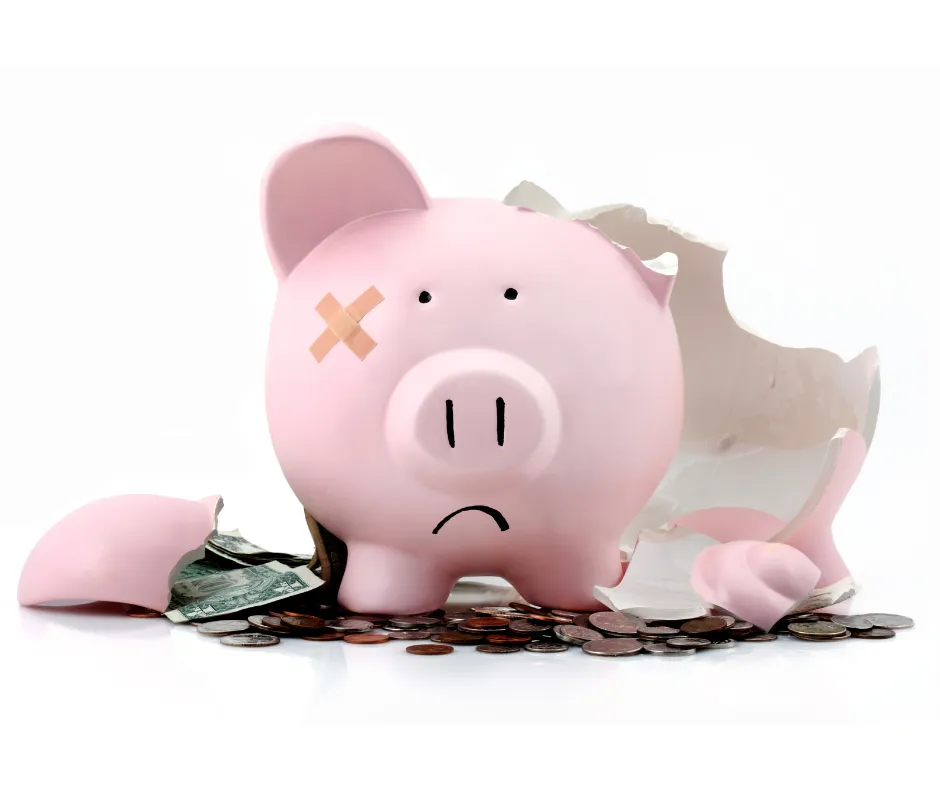
Access my free guide
Newly Single Jumpstart: 7 Financial Moves to Take Following the End of a Relationship
About Me

Jessica C. Koch, JD
Financial Coach and Advisor, Lawyer
My goal as a financial coach is to educate you on the basics of personal finance and, as a team, create a plan that reflects your values and goals. I aim to empower you to take responsibility for decisions, support you in your continued learning, and serve as an accountability partner and guide on your financial journey.
I help you decide what financial confidence means for you, work with you to embrace new habits, encourage you when the process gets tough, and hold you accountable to your goals.
My area of expertise and passion lies in helping women to take control of their finances following the end of a relationship. I started my career as a family lawyer, but I quickly realized I much prefer serving women going through divorce in other ways.
My experience as a family lawyer gives me a unique perspective when helping clients navigate post-relationship financial and emotional challenges.
In addition to my law degree, I am a certified financial advisor, a graduate of the Financial Coach Academy* and a Certified YNAB Coach**.
Blog

Budgeting When You're Broke
One question I get all the time from clients and group members here is How do I budget when I’m barely making it, so I wanted to hop on here quickly and give you a few tips on how you can start your budget even if you’re broke. Often, the reason you feel like you’re broke is because you don’t have a working budget - you don’t really know what’s coming in and what’s going out, you just have an idea in your mind. You are wrong, I guarantee you. The key is to actually know your circumstances.
I don’t want any of you to feel guilty for being in this situation - regardless of how much money you make, you can find yourself in a bad situation for reasons that are totally out of your control.
Right now, cost of living is going through the roof. Gas is expensive. Cars are expensive. Homes are expensive. Rent is expensive. And on top of all of that, emergencies like car repairs come out of nowhere.
And for many of you, a major life event like divorce or a death in the family might have been financially crippling.
So - just because you’ve found yourself in this position isn’t necessarily your fault. But the bottom line is, you ARE in this position, and the sooner you can take control, the sooner you can get yourself back onto stable ground.And this means you NEED to be living according to your budget, not budgeting according to your lifestyle. Tough love there, but there’s really no getting around it. There’s no magic bullet - it’s going to take getting real with yourself, making some tough choices, and finding the willpower to stick it out.
If you have more money going out than coming in, here's what your financial plan boils down to: spend less and/or earn more. To figure out how to do this, first take an assessment of your income and expenses. I’ve got ten steps to work through, to get yourself organized. Come back to this blog post often, to make sure you’re on track.
The number one thing you need to do right now is AVOID IMMEDIATE DISASTERS.
What I mean is this - if you are right now in a situation where you are going to be short on rent, for instance, look at your other less priority bills and make some decisions. Maybe you can postpone a cell phone bill or utility bill until your next paycheck, to make sure your rent is covered.
And this brings me to the second step - PRIORITIZE YOUR BILLS.
Gather all your most recent bill statements. Put them in order of which needs to be paid first through last during a month. Record this somewhere - a spreadsheet, word doc, journal, whatever.
Now, once you’ve got dates on all those bills - set up a payment schedule based on your paydays. That means, say your first paycheck of the month is $1,000. You don’t get paid for two more weeks. In these two weeks, you need to pay the rent, cell phone bill, and car insurance. Allocate money for each of those bills with this paycheck. Do the same with the next paycheck.
If you are currently behind on paying some of your bills - leave yourself some catch-up time. Call your bill companies (phones, electricity, landlord, etc.) and find out how much you can pay now to get yourself back on track. Don’t be afraid to let them know you’re catching up and getting yourself on a strict budget.Don’t be ashamed to ask for this. There are SO many people in this situation right now, I don’t want you to feel personally bad about it. Be honest with what you can afford - you’re really wanting to get yourself out of this situation for good, so don’t cause yourself future problems by overburdening yourself now.
Finally, organize this list in order of what absolutely needs to be paid first.
Next - you need to review your credit card payments and due dates. Do whatever you can to make sure you are not missing any payments - this will destroy your credit score, making it hard for you to get loans, find housing, all sorts of things.
Put your credit card payments in order of first to last, and automate the minimum payments. EX. $1000 balance, $40 due on the 5th of each month. Go to your chequing account…
If possible, stop using your credit cards altogether. Choose one to start paying more towards first, and put all your extra money to this debt until it’s gone. It doesn’t matter which debt, it just matters that you do it.
Whatever you choose to focus on, don't risk your finances unraveling by ignoring your debt. Late fees and interest can turn a small debt into an overwhelming one. Your debt should be a priority.
This next step is going to be controversial, but I’m going to say it. Ignore your savings entirely until you’re back on stable ground. If possible, have a stash of $500 or something to fend off car repairs etc. But even then - if you’re fending off debt collectors and huge interest rates, it makes more sense to clear those debts than to have a bit of money in savings right now.
Step five is one that lots of people avoid or put off doing, but it is CRITICAL. You MUST know your monthly spending. So, I want you to go back to the last full month and record ALL the spending you did. You cannot know where you are at, or where you are going, if you don’t know EXACTLY this number. Guessing or making an “educated guess” isn’t good enough. You must check your online banking statements, and total out what you spent last month in all categories. This is the only way you can make adjustments that will work. Record this however it makes sense to you, but make sure wherever you’re recording your financial information, you’re keeping it all together. There are some great apps you can use - YNAB is my favourite, but there is a small cost to it.
The next step 6 is a quick one, but it is going to involve swallowing some pride. Know that you are not the first and you won’t be the last person to do this. Try to negotiate your credit card interest rates. Call up your credit card companies, let them know you’re working to pay off all your debts, and ask for an interest rate reduction.
Step 7 - now that you’ve taken stock of how much you spend in a month, you need to start eliminating unnecessary expenses. Find the big-ticket items first - these will make the most difference. For instance, if you spend $300/month on gas, but there’s a bus route directly to work. That $300 will make a much bigger difference than the $20/week you spend on coffee. Maybe you can cut $100 - $200 from your grocery spend for a few months. That’s going to make a huge difference as far as what you can pay towards debt or overdue bills.
And now that you’ve made it through these first 7 steps, you are on to step 8 - you are ready to draft a new budget for the next month. Again - do this however works best for you. Use a budgeting app, write everything down in a notebook - it doesn’t matter. If you find it hard to organize yourself to do this on the daily, then set a google calendar notification for 1 - 2 hours on the weekend, to track all your spending that week. This is an important step, and anyone who tells you that you can get back on your feet without doing this step, is living in a fantasy world.
Once you’ve got a month of your new budget under your belt, work on step 9. Adjust your spending as needed. Take a look at how much over-budget you are. This means how much more you are spending than you are bringing in. Decide on places you can cut further. Don’t overlook places like cell phone bills - maybe you can work with a lesser cost plan for a little while. Or maybe you can shop only generic grocery brands for a few months. You need to do whatever it takes to push yourself out of the red.
If you find you’re having trouble eliminating discretionary spending - that’s extra spending that isn’t necessary, like coffee from Starbucks, or new makeup, or whatever. Try setting yourself a weekly limit that fits your budget, and take that out in cash. If it’s $40, once you’ve spent it for the week - it’s gone and you HAVE to wait until next week. No borrowing from next week's $40.
The final step, especially if you are still over budget, or you are not making progress towards your debt payoff that you’d like - you need to look for new sources of income. It might be asking for a raise, it might be picking up a side gig, it might be taking a job that pays more but the work is unattractive. You need to decide whether it’s better to be unhappy at work, or stressed out with debt. This doesn’t need to be permanent - it just needs to get you through.
And if you want or need my help to get yourself going - I have a 2 hour Breakthrough Session, that you will walk away from feeling calm, relieved and organized. You will leave this session with a fully prepared plan to get your money under control. The link to book the session is here: https://link.flowi.io/widget/booking/aztcHR7Z4HGiI7OFaVRF
Take care!
-Jes
Get In Touch
Book a FREE Q&A Call
This is a totally free, zero-obligation, 15 minute call, where you can ask all your questions and get a good idea of how we can work together.

*I completed the Financial Coach Academy, the industry’s leading financial coach training program, in April 2023. The Academy is like an MBA for financial coaches and I'm proud to continuously serve my clients by being a student of my craft. By completing the Academy, I have demonstrated my commitment to expanding my education, serving my clients, and growing my coaching business.

**I am a YNAB Certified Budgeting Coach, which means that I have been trained to coach people on using YNAB software and the YNAB budgeting method. I have met select requirements of You Need a Budget LLC in order to receive this certification, which means that I have the ability to competently coach YNAB to others. I am not an employee of YNAB, and all non-YNAB related opinions and recommendations are my own. My views do not reflect the views of YNAB and its employees or its affiliates.


